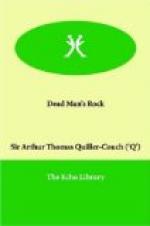I drew a chair under the great beam, and mounted it. When first my grandfather returned he had hung the iron key upon its hook, giving strict injunctions that no one should touch it. There ever since it had hung, the centre of a host of spiders’ webs. Even my poor mother’s brush, so diligent elsewhere, had never invaded this sacred relic, and often during our lonely winter evenings had she told me the story of it: how that Amos Trenoweth’s dying curse was laid upon the person that should touch it, and how the spiders’ days were numbered with every day that brought my father nearer home.
There it hung now, scarcely to be seen for cobwebs. Its hour had come at last. Even as I stretched out my hand a dozen horrid things hurried tumultuously back into darkness. Even as I laid my hand on it, a big ungainly spider, scared but half incredulous, started in alarm, hesitated, and finally made off at full speed for shelter.
This, then, was the key that should unlock the treasure—this, that had from the first hung over us, the one uncleansed spot in Lantrig: this was the talisman—this grimy thing lying in my hand. The spiders had been jealous in their watch.
Stepping down, I got a cloth and brushed away the cobwebs. The key was covered thickly with rust, but even so I could see that something was written upon it. For about a minute I stood polishing it, and then carried it forward to the light.
Yes, there was writing upon it, both on the handle and along the shaft—writing that, as it shaped itself before my eyes, caused them to stare in wrathful incredulity, caused my heart to sink at first in dismay and then to swell in mad indignation, caused my blood to turn to gall and my thoughts to very bitterness. For this was what I read:—
On the handle were engraved in large capitals the initials A. T. with the date MDCCCXII. Alone the shaft, from handle to wards, ran on either side the following sentence in old English lettering:—
THY HOUSE IS SET UPON THE SANDS AND THY HOPES BY A DEAD MAN.
This was all. This short sentence was the sum of all the vain quest on which my father had met his end. “Thy house is set upon the sands,” and even now had crumbled away beneath Amos Trenoweth’s curse “Thy hopes by a dead man,” and even now he on whom our hopes had rested, lay upstairs a pitiful corpse. Was ever mockery more fiendish? As the full cruelty of the words broke in upon me, once again I seemed to hear the awful cry from the sea, but now among its voices rang a fearful laugh as though Amos Trenoweth’s soul were making merry in hell over his grim jest—the slaughter of his son and his son’s wife.
White with desperate passion, I turned and hurled the accursed key across the room into the blazing hearth.
END OF BOOK I.
BOOK II.
THE FINDING OF THE GREAT RUBY.




